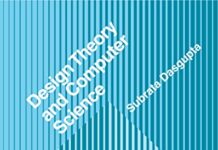
Ebook Info
- Published: 2016
- Number of pages: 168 pages
- Format: PDF
- File Size: 1.34 MB
- Authors: Subrata Dasgupta
Description
Over the past sixty years, the spectacular growth of the technologies associated with the computer is visible for all to see and experience. Yet, the science underpinning this technology is less visible and little understood outside the professional computer science community. As a scientific discipline, computer science stands alongside the likes of molecular biology and cognitive science as one of the most significant new sciences of the post Second World War era.In this Very Short Introduction, Subrata Dasgupta sheds light on these lesser known areas and considers the conceptual basis of computer science. Discussing algorithms, programming, and sequential and parallel processing, he considers emerging modern ideas such as biological computing and cognitive modelling, challenging the idea of computer science as a science of the artificial.ABOUT THE SERIES: The Very Short Introductions series from Oxford University Press contains hundreds of titles in almost every subject area. These pocket-sized books are the perfect way to get ahead in a new subject quickly. Our expert authors combine facts, analysis, perspective, new ideas, and enthusiasm to make interesting and challenging topics highly readable.
User’s Reviews
Reviews from Amazon users which were colected at the time this book was published on the website:
⭐When I first read this little book a couple of years ago I thought that Subrata Dasgupta must be a genius to be able to see so clearly the essence of this strange science. I especially was helped by his viewing programs as “liminal artefacts” (with both an abstract and a material face). The recommendations for “Further Study” are mainly “classics” such as works by Donald Knuth, so you can see that this is not meant to be a pop level introduction to programming but an overview of a new science. The book actually uses the word “wisdom” at one point in referring to the goal of this science of the liminal and it seems to me that it is best appreciated by anyone who wants a keener, and wiser, understanding of what “computer science” means. I’m writing this review because I’ve started reading through the book for my second time and re-discovering that it’s a great (little) book.
⭐If you are looking for a basic introduction to CS, this book isn’t for you. It is almost a philosophical look at CS and much of it might be incomprehensible to a beginner.
⭐The book presents a good overview of computer science, but some parts are hard to read for a novice. There are some valuable discussions at the beginning and, especially, at the end of the book, but a lot of complicated terminology in the middle.
⭐Too much definition of terms and little useful information.
⭐Satisfied.
⭐AOK
⭐I’ve ready many of the very short introductions, and few manage to accomplish what Dasgupta has done for computer science. His comprehensive and balanced overview is perfect preparation for further study—precisely what one would expect from the series.
⭐the epilogue is philosophical garbage.
⭐This is a very poor book which focuses more on how much the author can show-off and less upon conveying any useful information. The writing style is long-winded and verbose , and would benefit from a neater and more direct style.This “Very Short Introduction” has too much fluff and could be a lot shorter still.Other books exist that make a better job of summarising or introducing Comp. Science.
⭐A bit too philosophical for my liking. I would have liked something a bit more technical.
⭐The content covers main aspects of CS with well-balanced theoretical chit-chat. I will read it again for sure.
⭐On multiple locations in the Kindle version indexes and exponents are displayed as normal text. For example it shows 4 = log216. On other locations it’s more severe than this. This renders some parts of the book completely useless. In an introductory work this is especially detrimental.The formatting of the printed version is alright.Both versions contain minor mistakes like “1 megabit = 10^3 bits” (10^6 would be correct).
⭐Soddisfatto
⭐
Keywords
Free Download Computer Science: A Very Short Introduction (Very Short Introductions) 1st Edition in PDF format
Computer Science: A Very Short Introduction (Very Short Introductions) 1st Edition PDF Free Download
Download Computer Science: A Very Short Introduction (Very Short Introductions) 1st Edition 2016 PDF Free
Computer Science: A Very Short Introduction (Very Short Introductions) 1st Edition 2016 PDF Free Download
Download Computer Science: A Very Short Introduction (Very Short Introductions) 1st Edition PDF
Free Download Ebook Computer Science: A Very Short Introduction (Very Short Introductions) 1st Edition

